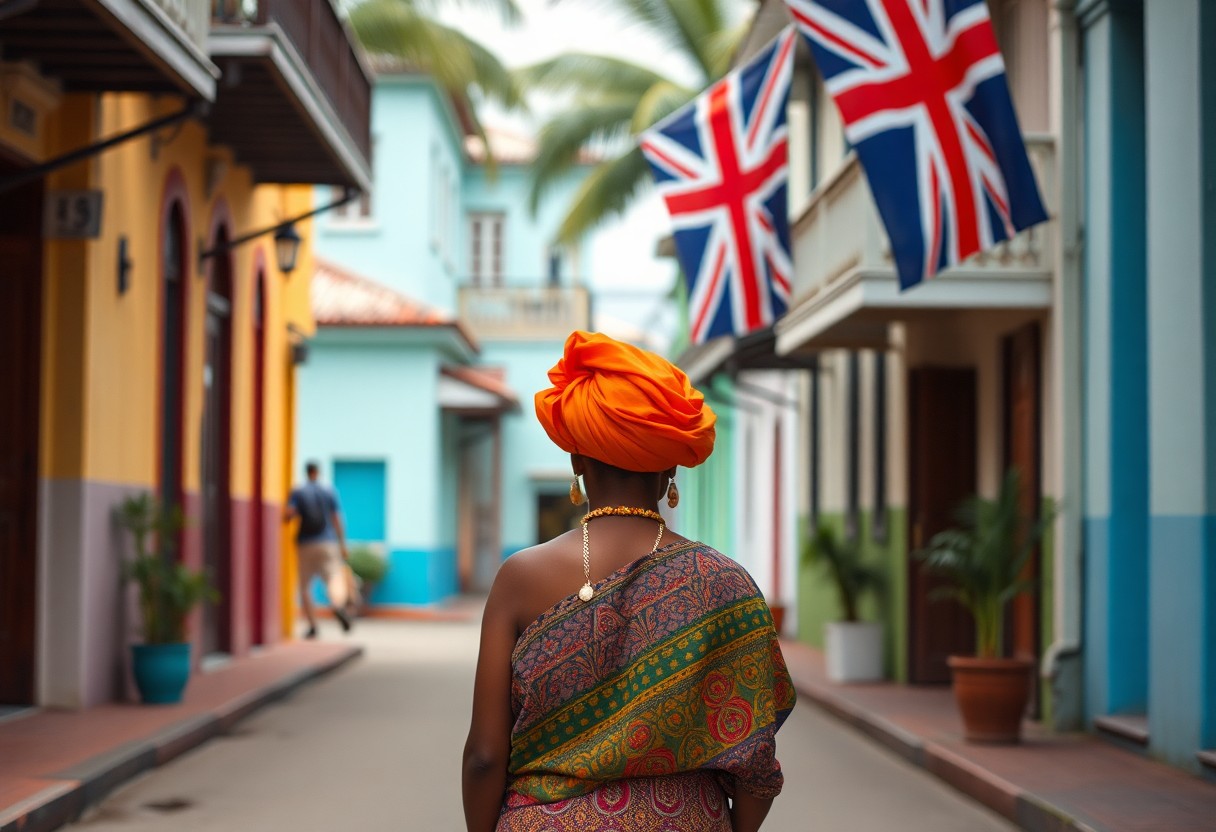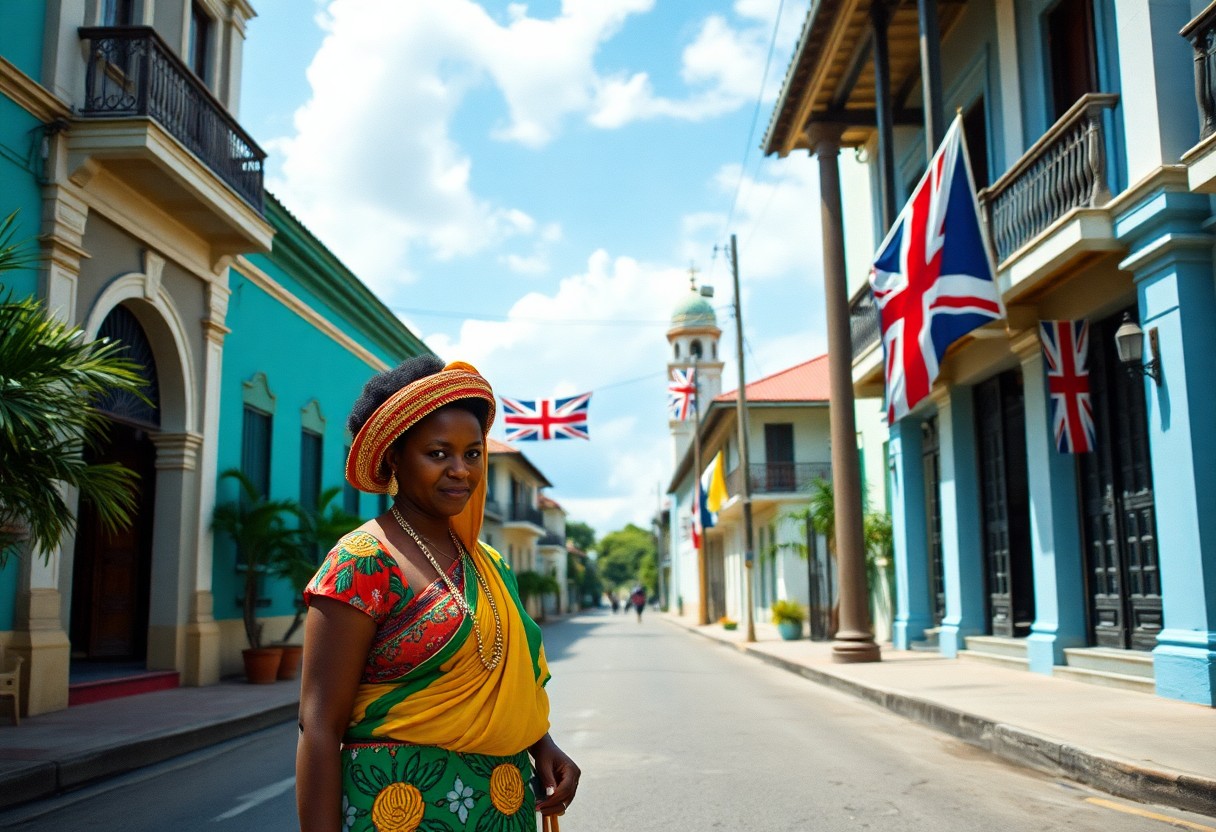Belize proudly holds the distinction of being the only English-speaking country in Central America, a title that reflects its unique linguistic heritage. This remarkable status is deeply rooted in its complex history and the enduring effects of British colonial influence. As you explore Belize’s historical narrative, you will uncover the significant contributions of British settlers, known as Baymen, who established their presence in the region during the 17th and 18th centuries. Their influence was transformative, leading to notable changes in both the local culture and language. The designation of British Honduras further cemented English as the official language, establishing a distinct linguistic identity that sets Belize apart from its predominantly Spanish-speaking neighbours.
Explore the Rich Historical Roots of Belize’s Unique Linguistic Identity
The evolution of language in Belize is intricately linked to its colonial past, characterized by a rich tapestry of diverse influences. The English-speaking identity of Belize is the result of a unique blend of British colonialism, interactions with local indigenous populations, and the effects of maritime trade. As you traverse the timeline of Belize’s history, it becomes evident how British intervention significantly shaped the nation’s cultural and linguistic development, transforming a region once marked by territorial disputes into a country with a vibrant and unique identity.
Discover the Profound Impact of the British Colonial Era on Belize
Starting in the early 17th century, the arrival of British settlers triggered a significant transformation of the linguistic landscape in Belize. The gradual adoption of English as the primary language for administration and commerce can be traced back to the activities of British logwood traders and settlers. Their economic pursuits, particularly in the timber industry and later in agriculture, systematically integrated English into local communication networks, fundamentally altering the path of Belize’s linguistic evolution. This shift laid the foundational groundwork for the flourishing of English within the region, establishing it as a dominating force in everyday communication.
Key Milestones in Belize’s Journey to Independence and Linguistic Establishment
The timeline outlining Belize’s journey towards independence encompasses a series of pivotal decades, reflecting numerous milestones from the period of British colonial rule to achieving sovereign nationhood in 1981. Key milestones include significant constitutional changes, such as the self-governance period that commenced in 1964 and the ensuing negotiations for independence. These developments illustrate a strategic transition that ensured the continued dominance of English as the official language, further embedding its status within the national framework.
Investigate Independence and Its Linguistic Implications for Belize
A deeper examination of Belize’s path to independence reveals a complex political transformation. You will gain insight into how peaceful negotiations with the United Kingdom enabled a smooth transition to self-governance. During this period, Belize maintained strong linguistic and administrative ties to British systems, which greatly influenced its continued use of English. Understanding this context highlights how Belize skillfully leveraged its colonial past to forge a distinct national identity while progressing toward independence.
How English Influenced Colonial Education Systems in Belize
Delving into the linguistic framework of Belize reveals that British colonial education policies were instrumental in shaping the country’s language dynamics. The British established English as the primary language of instruction, creating a strategic educational framework that has permanently altered Belize’s cultural communication landscape. This system ensured that English emerged as the dominant medium of learning, effectively transforming educational opportunities for countless generations of Belizeans and embedding the language deeply within the cultural fabric.
The Establishment of Educational Institutions Under British Rule in Belize
In Belize, educational institutions were established under the direct oversight of British colonial authorities, with missionary schools playing a vital role in the transmission of language and culture. These early educational establishments were not merely venues for academic instruction; they were specifically designed to propagate English linguistic norms. The British strategically established a network of schools prioritizing English language instruction, fostering a structured educational environment that gradually diminished the prevalence of indigenous languages.
Growth of Literacy Rates and Language Proficiency Among Belizeans
Your exploration reveals that English literacy rates in Belize saw remarkable growth during the colonial period. By the mid-20th century, approximately 75% of the population had developed functional English language skills, illustrating the effectiveness of the comprehensive educational initiatives implemented by British authorities. This transition was not simply an academic accomplishment; it represented a profound cultural transformation, reshaping the identity of Belizean society and facilitating greater social mobility.
Learning English became an essential tool for social advancement and economic development. You will see that language acquisition transcended basic educational objectives; it became a pathway to enhanced opportunities. The British colonial system effectively linked English proficiency to professional success, motivating Belizeans to master the language. Mastery of English opened doors to improved employment prospects, administrative roles, and elevated social status, thus making language a vital mechanism for cultural and economic integration.
Examining the Relationship Between Belize’s Official Language and Local Dialects
Diving deeper into Belize’s linguistic landscape, you will discover that the dynamics are intricate and multifaceted. While English holds the status of the official language, the nation’s communication is enriched by a diverse tapestry of cultural influences. You’ll find that language in Belize is not merely a binary phenomenon; it is a dynamic interplay of historical and social forces that shape communication across various communities and cultural contexts.
Assessing the Significance of English Within Belizean Society
Beyond its official designation, English serves as the primary language for government, education, and media. It is notable that around 63% of the population uses English as either their first or second language, underscoring its entrenched importance in Belizean society. This linguistic predominance is a direct consequence of the nation’s British colonial legacy, and it continues to play a crucial role in defining Belizean national identity and fostering unity among its diverse population.
The Emergence of Belizean Creole as a Unique Cultural Expression
Local Belizean Creole, often referred to as Kriol, stands out as a vibrant linguistic hybrid, showcasing a unique blend of English vocabulary and African grammatical structures. Approximately 37% of the population speaks this language, which serves as a powerful expression of cultural resilience and identity that transcends traditional colonial linguistic confines.
Research indicates that Belizean Creole originated during the era of slavery, evolving as a crucial communication medium among enslaved Africans from diverse linguistic backgrounds. You will appreciate how this language has transformed into a symbol of cultural survival and resistance, moving beyond a mere survival mechanism to become a proud marker of Belizean heritage and identity.
Highlighting the Diversity of Minority Languages Within Belize
On the fringes of the linguistic spectrum, you will uncover Belize’s remarkable array of languages. Maya languages such as Q’eqchi’ and Mopan, along with Spanish and Garifuna, coexist within this multilingual landscape, representing about 25% of the population’s linguistic diversity. This rich variety echoes Belize’s complex historical and cultural interactions, showcasing the enduring legacies of both indigenous and immigrant communities.
The linguistic variety in Belize serves not just as a means of communication; it stands as a testament to cultural preservation. You will find that speakers of minority languages actively strive to maintain their linguistic heritage through community education, cultural celebrations, and intergenerational transmission. These languages function as living repositories of historical and cultural knowledge, preserving the narratives and traditions of Belize’s diverse ethnic groups.
Understanding the Contemporary Implications of Language Diversity in Belize
Belize’s linguistic heritage reflects its multifaceted colonial past while also shaping modern social and economic dynamics. You will discover that the multilingual landscape presents unique opportunities and challenges, with English acting as a unifying force while simultaneously preserving the nation’s rich cultural diversity. This intricate linguistic tapestry enables Belizeans to navigate global interactions while honoring their distinct national identity and cultural heritage.
Investigating Education Systems and Bilingual Initiatives in Belize
Language plays a pivotal role in Belize’s educational framework, where bilingual education is actively promoted. As you explore this aspect, you will find that schools emphasize instruction in both English and Spanish, empowering students to cultivate comprehensive communication skills. This dual-language approach ensures that students can appreciate multiple cultural perspectives, preparing them for diverse professional opportunities in an increasingly interconnected global landscape.
The Role of English in Government Communication Practices
Official government communications are predominantly conducted in English, significantly enhancing administrative efficiency. You will observe that official documents, legislative proceedings, and public announcements are consistently published in English, reflecting the enduring influence of British administrative practices within the nation.
Gaining insight into Belize’s governmental language practices reveals a nuanced communication strategy. While English remains the principal administrative language, there is an increasing recognition of the importance of multilingual communication emerging within government institutions. Official translations and multicultural outreach programs indicate a commitment to inclusive governance that respects and acknowledges the country’s linguistic diversity.
The Economic Significance of English in Belize’s Thriving Tourism Sector
In the wake of British colonial influence, English has evolved into a strategic economic asset. You will appreciate how this linguistic advantage attracts international visitors and investors, establishing Belize as a welcoming destination for English-speaking travelers and businesses seeking new opportunities.
The presence of multilingualism is reshaping Belize’s economic landscape, creating competitive advantages in global markets. You will witness how the ability to communicate effectively in English facilitates international trade, tourism growth, and cross-cultural business engagements. This linguistic adaptability positions Belize as a desirable location for foreign investment and cultural exchanges, further enhancing its economic prospects.
The Enduring Legacy of British Influence on Language in Belize
Despite its geographical proximity to Spanish-speaking nations, Belize’s unique linguistic heritage is a direct result of British colonial rule. You will find that the English language became deeply embedded during the long history of British Honduras, establishing a distinctive linguistic landscape that sets Belize apart from its Central American neighbours.
Forging a Distinct Cultural Identity and National Pride Through Language
Before gaining independence in 1981, Belizeans cultivated a complex cultural identity that fused British administrative traditions with local indigenous and Caribbean influences. This rich multicultural heritage transformed English from a mere colonial language into a symbol of national unity and pride, reflecting the nation’s diverse cultural tapestry and shared history.
Maintaining Constitutional Connections to the British Monarchy
Belize retains a fascinating constitutional connection to the British Crown, functioning as a Commonwealth realm. You will observe that historically, Queen Elizabeth II served as the head of state, with a Governor-General representing her interests in Belize, thereby maintaining continuity in governance.
The intertwining of cultures continues in Belize’s ongoing relationship with the British monarchy. While the King of the United Kingdom remains the official head of state, day-to-day governance is managed by Belizean elected officials. This unique arrangement serves as a symbol of the enduring diplomatic and historical ties between Belize and the United Kingdom, reflecting a blend of tradition and modern governance.
Understanding Belize’s Political Framework: Governance Structure and Language
In 1981, Belize transitioned to a parliamentary democratic system modeled after the British Westminster framework. You will find that this political structure guarantees democratic representation while simultaneously maintaining symbolic connections to British governmental traditions that have shaped Belize’s political landscape since colonial times.
The cultural legacies of British governance continue to influence Belize’s political structure. The country operates under a parliamentary democracy, with a Prime Minister serving as the head of government and a monarch acting as the ceremonial head of state. This governance system not only reflects the enduring influence of British administrative traditions but also underscores the importance of language in national identity and political discourse.
Exploring Sociolinguistic Studies in Belize and Their Findings
A multitude of sociolinguistic researchers have investigated the intricate language dynamics of Belize, focusing on how English intertwines with Creole, Spanish, and Indigenous languages. You will find that the linguistic landscape serves as a reflection of the country’s unique multicultural heritage. Academic studies highlight how language operates as a critical marker of national identity, tracing the complex social interactions that shape communication across diverse communities.
Examining Attitudes Towards Language and Their Social Perception
Research on language attitudes in Belize illustrates how English functions as a symbol of social mobility. You may be surprised to learn that perceptions of language can profoundly influence social opportunities. Linguistic studies indicate that proficiency in English is often linked to educational and professional advancement, creating a complex social hierarchy that affects interpersonal relationships and economic prospects.
Documenting Linguistic Diversity Through Comprehensive Research Initiatives
Academic research in Belize has meticulously documented the remarkable linguistic diversity within the nation. You will discover that scholars have systematically mapped language variations across regions, capturing the nuanced ways in which communities engage and communicate. These documentation efforts serve to preserve the rich linguistic tapestry that characterizes Belize’s unique communication patterns and cultural heritage.
Given the depth of linguistic research, you’ll find that thorough documentation plays a critical role in understanding Belize’s language ecosystem. Researchers have undertaken extensive fieldwork to gather data on language usage, document endangered languages, and analyze the intricate interactions between English, Creole, Spanish, and Indigenous languages. Your appreciation of Belize’s linguistic landscape will be further enriched by these systematic scholarly investigations, revealing how language mirrors historical, social, and cultural transformations.
Exploring Language in the Realm of Belizean Popular Culture
Your examination of Belize’s linguistic landscape reveals how English permeates daily life, reflecting the country’s multifaceted historical narrative. The language acts not only as a communication tool but also as a cultural identifier that connects diverse ethnic backgrounds, uniting Belizeans through a shared linguistic heritage rooted in British colonial history.
Music and Arts: Powerful Mediums of Cultural Expression in Belize
Through the creative use of English, Belizean artists transform language into a vibrant vehicle for cultural storytelling. Musical genres such as punta rock and traditional Creole performances exemplify how English intertwines with local rhythms, enabling artists to convey nuanced experiences of identity, struggle, and celebration, thus enriching the cultural fabric of Belize.
The Role of Media in Shaping Language Perception and Usage in Belize
Within Belize’s media landscape lies a robust linguistic ecosystem where English predominates across television, radio, and digital platforms. Local news channels and radio stations primarily broadcast in English, reinforcing its status as the principal communication channel and national language.
Culture plays a transformative role in media’s linguistic influence, with broadcasting networks strategically utilizing English to reach a diverse audience. Approximately 63% of Belizean media content is produced in English, underscoring its significant impact on language perception and national communication strategies. Your understanding of this dynamic illustrates how media functions as a critical language preservation mechanism, ensuring the relevance of English in contemporary Belizean society and culture.

Addressing Challenges in the Preservation of Language Diversity in Belize
Despite the rich tapestry of linguistic diversity, Belize faces significant challenges in preserving its unique linguistic heritage. You will find that while English retains its status as the official language, the nation’s linguistic landscape is increasingly threatened by gradual language erosion and evolving social dynamics that challenge traditional communication patterns.
Identifying the Threats to Local Languages in Belize
At the intersection of globalization and cultural transformation, indigenous languages such as Kriol, Garifuna, and Maya face unprecedented pressures. You can observe how younger generations are increasingly opting for English, potentially leading to a dramatic decline in linguistic heritage within just one or two generations if proactive measures are not taken.
Implementing Effective Strategies for Language Maintenance in Belize
Preserving the linguistic diversity of Belize necessitates comprehensive, multifaceted approaches. You will discover that educational initiatives, community involvement, and cultural documentation play crucial roles in safeguarding linguistic diversity. Local schools are adopting bilingual curricula to ensure that younger generations remain connected to their linguistic roots and cultural heritage.
Addressing the threats to linguistic diversity requires proactive measures. It is essential to recognize that preserving languages involves more than mere academic documentation—it demands active community engagement. Collaborative efforts between government entities, educational institutions, and indigenous communities can foster sustainable language revitalization programs. Additionally, digital platforms, multimedia resources, and intergenerational knowledge transfer are increasingly vital in maintaining Belize’s linguistic richness and diversity.

Conducting In-Depth Comparative Linguistic Analysis in Belize
To appreciate the complexity of Belize’s linguistic environment, you will encounter a nuanced comparison between its language patterns and regional variations. The following table illustrates key linguistic characteristics:
| Language Characteristic | Belize Specifics |
|---|---|
| Primary Language | English (Official) |
| Secondary Languages | Spanish, Kriol, Garifuna |
Contextualizing English Within the Caribbean Linguistic Framework
A significant aspect of Belize’s linguistic heritage is its alignment with Caribbean English variants. You will observe that British colonial influence has profoundly shaped language development, resulting in distinctive communication patterns that are shared across former British territories in the region.
Unveiling Belize’s Unique Linguistic Landscape and Its Diversity
History reveals that the evolution of language in Belize is a product of complex colonial interactions. You’ll discover a vibrant multilingual environment where English coexists alongside indigenous and immigrant languages, reflecting the country’s rich cultural diversity and historical complexity.
This context demonstrates that Belize’s linguistic diversity is more than a historical artifact; it serves as a powerful narrative of survival, adaptation, and cultural resilience. You will appreciate how English acts as a unifying medium while simultaneously preserving unique cultural identities, with approximately 62.9% of the population communicating in English as either a primary or secondary language.

International Influences that Shape Belize’s Linguistic Landscape
International dynamics have not only shaped Belize’s linguistic environment but have also profoundly impacted its cultural and economic development. The British colonial legacy intertwines with ongoing international relationships, crafting a unique national identity that transcends traditional boundaries. Your exploration of Belize’s linguistic evolution reveals a complex narrative of power, migration, and cultural exchange.
Globalization and Its Impact on Linguistic Dynamics in Belize
By embracing global communication networks, Belize has positioned itself as a multilingual hub where English serves as a strategic advantage. Your investigation into linguistic dynamics uncovers how international trade, tourism, and educational exchanges have solidified English's role as a primary communication tool, enabling Belizeans to engage effectively in global conversations and markets.
The Influence of Diaspora Communities on Language Practices in Belize
In any discussion regarding Belize’s linguistic identity, it’s essential to acknowledge the substantial impact of diaspora communities. Migrant networks have consistently reinforced English language practices, establishing transnational connections that sustain cultural and linguistic continuity across borders.
The transformation of Belize’s social fabric is largely attributed to trade networks and migration patterns. Diaspora communities residing in the United States, United Kingdom, and Canada have maintained strong ties to their homeland, facilitating remittances, sharing cultural knowledge, and preserving linguistic traditions. Your understanding of these dynamics highlights how approximately 15% of Belize’s population lives abroad, creating powerful channels of cultural and linguistic exchange that continually reshape national identity.
Projecting the Future of Language in Belize: Trends and Developments
It’s important to recognize that Belize’s linguistic landscape continues to evolve, blending historical influences with modern dynamics. Although English remains the official language, the nation’s multilingual identity holds promise for an exciting and diverse future. You will find that Belize’s commitment to linguistic diversity reflects its rich cultural heritage, with Creole, Spanish, and indigenous languages playing integral roles in shaping communication patterns and social interactions.
Anticipating Linguistic Trends and Future Developments in Belize
In the context of globalization and local cultural preservation, you can expect Belize’s language ecosystem to become increasingly complex. Younger generations are likely to become more multilingual, with heightened proficiency in Spanish and indigenous languages alongside English. The country’s educational policies and economic opportunities will continue to shape these linguistic transformations, potentially creating a more nuanced communication landscape.
The Importance of Language Policy and Strategic Planning for Belize’s Future
Language policy is critical in shaping Belize’s linguistic future, with governmental strategies and educational initiatives taking













